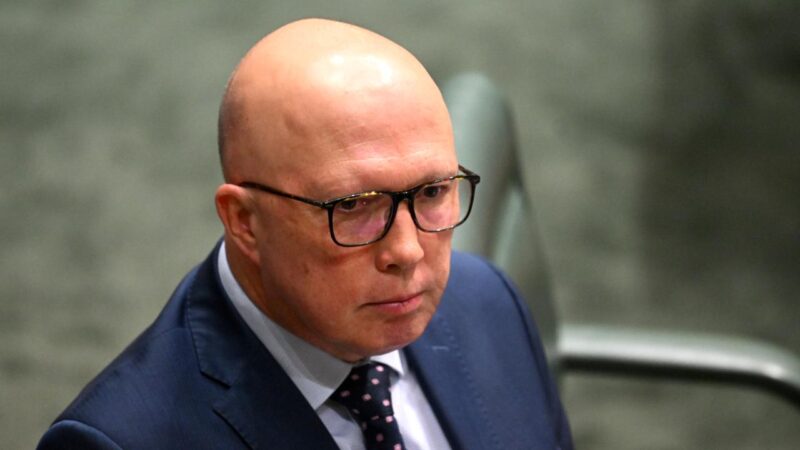Opposition leader Peter Dutton is trying to kill off Labor’s multinational tax avoidance reforms, already watered down as they are. Mark Zirnsak with the state of play in the Senate.
In the wake of the PwC scandal, it might be expected that measures to tackle multinational tax avoidance – and to rein in the tax advisors that facilitate this profit shifting – would sail through the Australian Parliament.
However, the Albanese government is facing strong headwinds in the Senate for its tax reform proposals, with the Peter Dutton-led Coalition putting significant effort into seeing them watered.
As a reminder, the PwC scandal is where a senior PwC tax adviser breached binding confidentiality agreements to share information about proposed tax reforms with his colleagues so they could market tax arrangements to beat the reforms to their corporate clients and potential clients.
There are two measures before the Senate currently facing strong efforts to water them down:
- Legislation that would require greater public transparency of the tax and financial affairs of multinational corporations; and,
- Reforms to the mandatory Code that covers tax advisers that would require them to report evidence of tax evasion and avoidance to the Australian Taxation Office (ATO).
On the first measure, the Treasury Laws Amendment (Responsible Buy Now Pay Later and Other Measures) Bill 2024 would implement public country-by-country reporting for large multinational corporations.
Such reporting will increase the ability to detect tax avoidance and profit shifting by exposing if the location of profits matches with where the corporation has its actual business activities. The measure would be world-leading and set a standard for other governments to follow. Public country-by-country reporting by multinational corporations has been a key ask of the global Tax Justice Network movement.
It is therefore hardly surprising that multinational corporations have lobbied hard to undermine the measure.
Dutton … weaken the laws by providing corporations with a self-assessment mechanism
The Dutton Opposition has jumped to support of the corporations and has sought to weaken the proposed laws by providing the corporations with a self-assessment mechanism where they can declare any information is “commercially sensitive information”.
PwC and the legal privilege scam
The concealed information would be revealed in five years. Such a clause is highly likely to be abused. For example, at the hearing of the Parliamentary Joint Committee on Corporations and Financial Services on August 2 2024, PwC admitted to falsely claiming Legal Professional Privilege over documents on the tax affairs of their multinational corporate clients to which the ATO was seeking access.
… they can’t be trusted
Legal Professional Privilege (LPP) denies the ATO the ability to access such documents. PwC has claimed LPP on over 44,000 documents and it is not clear on how many of these the LPP had been falsely asserted. The multinational corporations and their tax advisers have demonstrated they cannot be trusted to make self-assessments on blocking the publication of their financial affairs.
In the Senate balance
At the moment, the Government is holding strong and can count on the Greens and Senators Lidia Thorpe and David Pocock to oppose the Coalition’s efforts to undermine the law. They will need one more Senator if the new law is to be protected from being gutted.
The second matter before the Senate relates to reforms to the mandatory Code of Professional Conduct for tax advisers.
The key battle is that the Code reforms would require that if a tax adviser becomes aware that a client has provided materially false or misleading information about their tax affairs to the ATO, the tax adviser must ask the client to correct the information.
If the client does not correct the information, the tax adviser will need to inform the ATO. Clients who deliberately provide false and misleading information to the ATO are usually involved in tax avoidance or tax evasion.
We have been informed by multiple sources that some tax advisers have been privately lobbying saying it is not the role of a tax adviser to act in the public interest to prevent tax avoidance and tax evasion, with their only loyalty being to their clients.
Understandably, that is not something any of them have been willing to say in public.
Australian laws allow for inconsistency between businesses that detect signs of possible tax evasion. Businesses that are reporting entities under the Anti-Money Laundering Counter-Terrorism Financing Act 2006 are required to report to AUSTRAC suspicious activity that might indicate money laundering where tax evasion is the underlying predicate offence.
By contrast, registered tax agents have not been required to report to the ATO when they become aware that a client has made a materially false or misleading statement that may indicate a tax evasion predicate offence. The UK Chartered Institute of Taxation has stated that “returns with deliberately incorrect statements or deliberately omitted income” are indicators of possible tax evasion.
The Coalition Opposition moved a motion in the Senate that would have killed off the Code reforms altogether.
The government only just defeated the motion, after it agreed to clarify some aspects of the reforms in the Code changes through further regulation and to water down the obligation to report clients that have provided materially false and misleading information to the ATO.
Treasury is currently consulting on the changes called for by some cross-bench senators.
Until October 9, it will still be possible for the Coalition, with the support of enough of the Senate cross-bench, to kill off the reforms to the Code. Several peak bodies for tax advisers are lobbying hard to either kill off the reforms or ensure they are weakened.
Mark Zirnsak acts as secretariat for the Tax Justice Network in Australia and is a senior social justice advocate for the Uniting Church.

